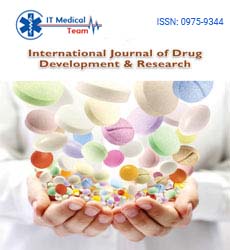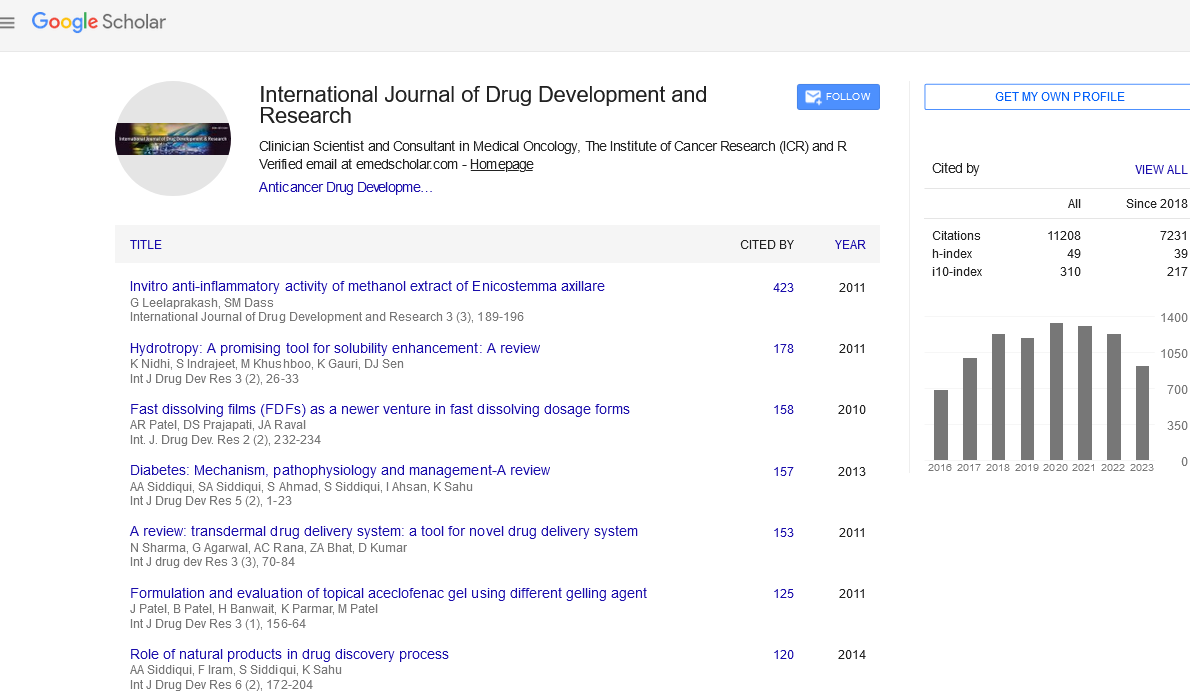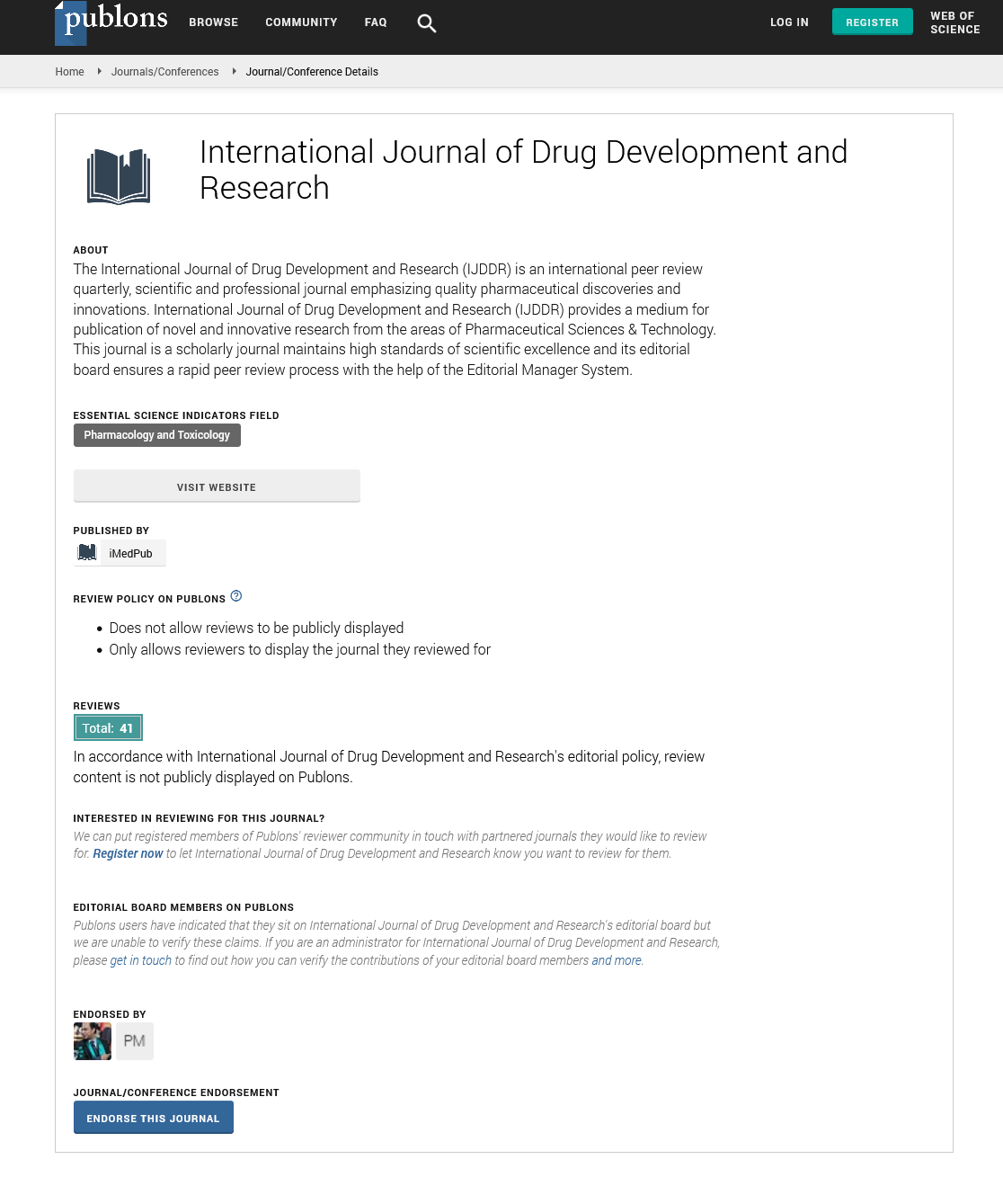Perspective - (2024) Volume 16, Issue 2
Breaking Barriers: A New Dawn in Neurodegenerative Disease Therapies
Ellack Wang*
Department of Neurosciences, University of Copenhagen, Copenhagen, Denmark
*Correspondence:
Ellack Wang, Department of Neurosciences, University of Copenhagen, Copenhagen,
Denmark,
Email:
Received: 06-Mar-2024, Manuscript No. IJDDR-24-14619;
Editor assigned: 08-Mar-2024, Pre QC No. IJDDR-24-14619 (PQ);
Reviewed: 22-Mar-2024, QC No. IJDDR-24-14619;
Revised: 05-Apr-2024, Manuscript No. IJDDR-24-14619 (R);
Published:
12-Apr-2024
Introduction
Neurodegenerative diseases, encompassing conditions like
Alzheimer's, Parkinson's, and ALS, pose significant challenges to
patients, caregivers, and healthcare systems worldwide. These
conditions not only rob individuals of their cognitive and motor
functions but also place immense emotional and financial
burdens on families. However, recent years have witnessed
remarkable strides in the field of neurodegenerative disease
therapies, offering newfound hope in the quest for effective
treatments. This article explores the latest advances, innovative
approaches, and promising avenues in combating these
devastating disorders.
Description
Understanding the landscape of neurodegeneration
Neurodegenerative diseases are characterized by the
progressive degeneration and death of neurons in the central
nervous system. Alzheimer's disease, the most common form of
dementia, is marked by the accumulation of amyloid plaques
and tau tangles in the brain. Parkinson's disease involves the
loss of dopaminergic neurons in the substantia nigra, leading to
motor impairments. ALS, or amyotrophic lateral sclerosis, affects
motor neurons, resulting in muscle weakness and paralysis.
Traditional treatments and their limitations
Historically, treatments for neurodegenerative diseases have
focused on symptom management rather than addressing the
underlying pathology. Drugs such as acetylcholinesterase
inhibitors and dopamine agonists provide temporary relief but
do not halt disease progression. Moreover, many experimental
therapies have failed in clinical trials, underscoring the
complexity of these conditions and the need for novel
approaches.
Advances in targeted therapies
One of the most promising areas of research in
neurodegenerative disease therapy is the development of targeted
treatments aimed at specific molecular pathways implicated in
disease pathogenesis. For example, monoclonal antibodies
targeting amyloid-beta and tau proteins have shown promise in
slowing cognitive decline in Alzheimer's patients. Similarly, gene
therapy approaches, including antisense oligonucleotides and
viral vectors, hold potential for halting the progression of ALS by
targeting disease-causing mutations.
Emerging role of immunotherapy
Immunotherapy, which harnesses the body's immune system
to target and eliminate pathological proteins, is gaining traction
as a potential treatment strategy for neurodegenerative
diseases. Checkpoint inhibitors, originally developed for cancer
immunotherapy, are being repurposed to modulate immune
responses in Alzheimer's and Parkinson's. Furthermore,
therapeutic vaccines designed to stimulate the immune system
against toxic protein aggregates are showing encouraging
results in preclinical studies.
The promise of regenerative medicine
Regenerative medicine holds immense promise for repairing
damaged neurons and restoring lost function in
neurodegenerative diseases. Stem cell therapies, including
induced Pluripotent Stem Cells (iPSCs) and Mesenchymal Stem
Cells (MSCs), offer the potential to replace lost neurons and
provide neuroprotective effects. Clinical trials exploring the
transplantation of stem cell-derived dopaminergic neurons in
Parkinson's patients have shown encouraging preliminary
results, paving the way for further investigation.
Harnessing the power of neuroplasticity
Another frontier in neurodegenerative disease therapy is the
concept of neuroplasticity, the brain's ability to reorganize and
form new neural connections in response to injury or disease.
Non-invasive brain stimulation techniques such as Transcranial
Magnetic Stimulation (TMS) and transcranial Direct Current
Stimulation (tDCS) are being investigated as potential adjunctive
therapies to enhance neuroplasticity and improve cognitive and
motor function in patients with neurodegenerative diseases.
Challenges and considerations
Despite the promising advances in neurodegenerative disease
therapies, significant challenges remain on the path to effective
treatments. These include the need for early and accurate diagnosis, the development of biomarkers for disease monitoring
and patient stratification, and the optimization of treatment
delivery methods to ensure efficacy and safety. Moreover,
regulatory hurdles and ethical considerations must be carefully
navigated to bring novel therapies from the laboratory to the
clinic.
Conclusion
The landscape of neurodegenerative disease therapies is
rapidly evolving, driven by advances in our understanding of
disease mechanisms and innovative therapeutic approaches.
While significant challenges lie ahead, the collective efforts of
researchers, clinicians, and industry stakeholders offer hope for
a future where effective treatments for neurodegenerative
diseases are within reach. By continuing to push the boundaries
of science and collaboration, we can strive towards a world
where individuals affected by these devastating conditions can
live with dignity and hope for a better tomorrow.
Citation: Wang E (2024) Breaking Barriers: A New Dawn in Neurodegenerative Disease Therapies. Int J Drug Dev Res Vol:16 No:2






